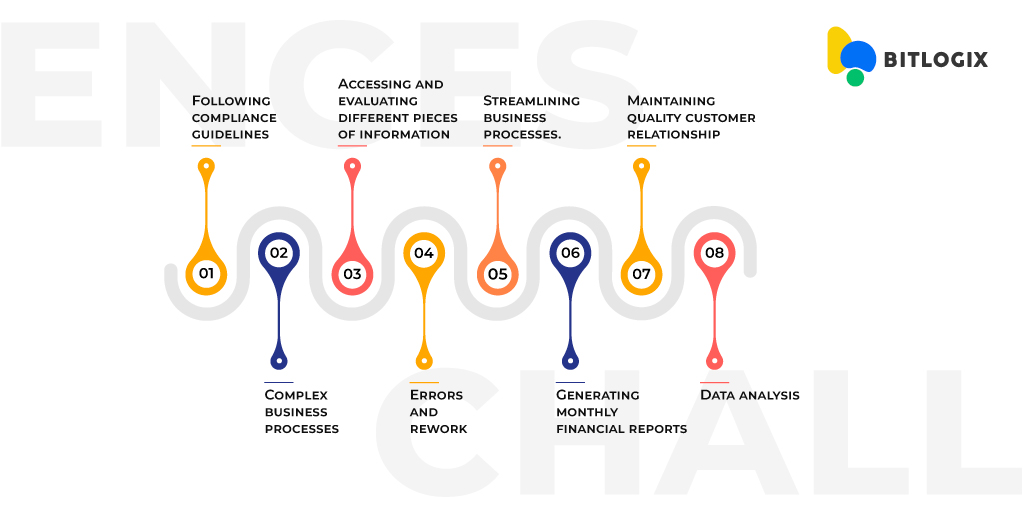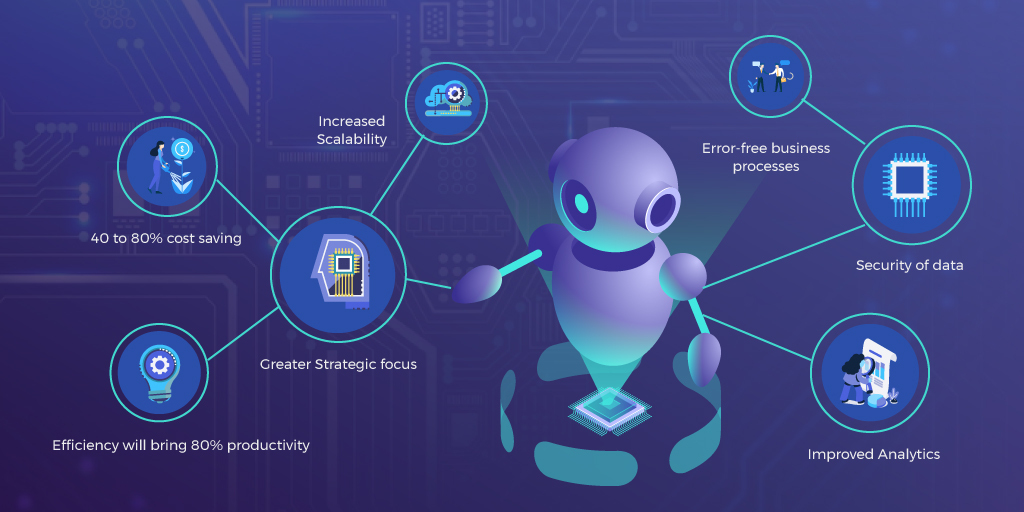
During a pandemic, automation in business processes was the only option to disrupt the growing downfall in the economic landscape. The whole period of the pandemic caused massive digital advancement and automation in business processes. Automation in business processes was the only way to effectively deal with multiple business challenges in COVID.
According to the global RPA survey conducted by Deloitte, 53% of respondents have already started their RPA journey. And it is further expected to increase by 72% in the next two years. If the RPA adoption rate continues at the same rate, RPA will reach new heights in universal adoption in the next five years.
Gartner surveys and polls show that over 80% of organizations consistently self-report increased or continued investment in hyper-automation initiatives.
This blog will help you understand how RPA can overcome business challenges and improve business processes.
Common business challenges where RPA can help you?

Every business goes through some common challenges. These challenges can affect the productivity of the business. RPA can do more than you think in dealing with business challenges. Let’s look at the most expected challenges a business can face and how RPA effectively deals with these challenges.
- Inflation and economic downturn
- Following regulatory guidelines
- Complex business processes
- Accessing and evaluating relevant information
- Errors and rework
- Streamlining business processes.
- Data analysis
- Generating monthly financial reports
- Maintaining quality customer relationship
- Increasing customer expectation
-
Inflation and economic downturn
According to the reports of the IMF, global growth is forecast to slow from 6.0 percent in 2021 to 3.2 percent in 2022 and 2.7 percent in 2023. This is the weakest growth profile since 2001 except for the global financial crisis and the acute phase of the COVID-19 pandemic.
According to another IMF report, the global inflation rate is forecast to rise from 4.7 percent in 2021 to 8.8 percent in low-cost 2022 but to decline to 6.5 percent in 2023 and to 4.1 percent by 2024.
The world is already making statements about the skyrocketing inflation at the beginning of 2023. The companies are working to find out low-cost resources for better production matrixes. RPA can offer a profitable solution to various businesses and reduce operations costs with improved productivity.
With the growing risks of financial instability and recession, RPA implementation is a must to survive. According to the reposts of the IMF, the organization had downgraded its forecast for 2.9 percent global growth in 2023.
-
Following regulatory guidelines
Regulations and rules change as markets and technologies change. It is certainly not easy to deal with a business’s financial and accounting processes to keep up with frequent changes in government regulations.
In order to mitigate non-compliance risks, robotic process automation can help you keep track of the numerous updates and ensure financial activities such as claims processing comply with regulations. As a result, human errors will be prevented, and process execution can be sped up. According to research reports from Deloitte, RPA improves compliance by 92%.
The use of RPA also boosts productivity and reduces costs in the accounting and finance departments by automating processes such as accounts payable, payrolls, and a lot more similar activity.
-
Complex business processes
Complex business processes are always challenging for businesses. Simplifying these complexities can boost productivity along with accuracy in the process. The complexity of processes can further cause errors. RPA can easily perform logic-based business processes with the same efficiency, accuracy, and productivity. It manages complex business functions with great accuracy.
-
Accessing and evaluating relevant information
Data holds great importance in any business. Extracting the right information and data can be a time-consuming and mundane task. It can lead to making or breaking the business strategy. Therefore, access to the right data insights is challenging for most businesses. RPA automates extracting and accessing important data and performs operations quickly without delays.
-
Errors and rework
The research reports of Deloitte predict RPA brings 90% accuracy and quality in business processes.
Every year, human errors cost organizations over $62.4 million, according to a whitepaper by IDC. After implementing RPA, organizations can reduce their costs by over 65% and achieve a return on investment within six months.
Manual processes cause mistakes on a minor or major level. Moreover, the workforce can easily commit mistakes while doing the same tasks repeatedly. RPA can ensure error-free business processes where the need for rework will be reduced. Thus, RPA can automatically analyse the errors and prevent the need for rework.
-
Streamlining business processes
In a report published by the McKinsey Global Institute, 40% of finance activities can be fully automated, and 17% to a considerable extent. Implementing RPA solutions is the best suited to address these challenges and achieve the expected efficiency via process simplification and establishing standardized reporting mechanisms.
According to Deloitte, 95% percent of organizations implementing robotic process automation (RPA) say it has improved productivity. The study also found that 93% of those implementing RPA believe it has improved compliance, 81% say it has reduced costs, and 77% claim it has provided better management information.
In this digitalized world, automating business processes is the need of the hour. In various business processes, delays cause a considerable increase in the cost of operations. Moreover, productivity also declines. It is still a major challenge for the CEO to streamline activities for more productive results. Hence, taking help from technology is mandatory to streamline complex business processes. It will help you save time and perform accurate business operations.
In order to improve efficiency, streamlining business processes is important to manage revenues, disbursements, financial planning, payroll, accounts payable, receivable, and record-to-report processes in your company. Without automation, dealing with all these factors can become challenging.
-
Data analysis
Data analysis is important in most cases while doing any business operations. The process of data analysis can be time-consuming that can affect the productivity and efficiency of the operation. RPA follows specific instructions and performs a function based on quick data analysis.
-
Generating monthly financial reports
Manual financial report-making is time-consuming and demands a lot of care and attention. Still, the chances of errors will remain high. Moreover, preparing financial reports is the most important factor in any business. Thus, errors in this process cannot be acceptable in any industry. RPA ensures the error-free generation of financial reports.
-
Maintaining quality customer relationships
Customer relationship is key to growing your business. Maintaining good customer relationships becomes a challenge for organizations. Good customer relationship demands great user engagement, quick solution to their concerns, and quick delivery of services along with a dedicated team. RPA can deal with all these areas with great productivity and ensure maximum user engagement.
According to the reports of Deloitte, RPA promises 86% improvement in the organization’s productivity.
Moreover, RPA automates most of the processes and offers efficient solutions and services which add positive value to improve customer relationships. Furthermore, accuracy and efficiency in the process improve customer loyalty and long-term relationship.
-
Increasing customer expectation
The increasing involvement of digital solutions in the global pandemic period gave birth to improved customer experience. To survive the lockdown period, it was necessary to opt for technological support and disrupt the growing downfall. Technical advancement played a key role in improving business matrixes and gave birth to the competition.
According to Statista, in 2022, spending on digital transformation (DX) is projected to reach 1.6 trillion U.S. dollars. By 2026, global spending on digital transformation will reach 3.4 trillion U.S. dollars.
Thus, customer expectations are increasing with the growing digital advancement in the market. The right use of technology can be very helpful in dealing with the growing competition.
RPA can be a game changer in offering the best user experiences, as it automates the processes and replies to the user query in no time. Moreover, process automation keeps the users engaged with the brands.
What benefits can you expect from RPA technology?

With RPA implementation, you can expect various benefits for your business. Let’s look at some of the most common benefits of implementing RPA.
- 40 to 80% cost saving
- Greater Strategic focus
- Efficiency will bring 80% productivity
- Increased scalability
- Improved analytics
- Security of data
- Error-free business processes
Bottom line
Technology is successfully proposing solutions in every business domain. Similarly, the right RPA implementation approach can effectively solve various business challenges. The right process automation approach is mandatory to enjoy benefits to the maximum extent.
Disruptive technology is currently reshaping the finance function, opening up new horizons of productivity and performance. Your most complex business challenges can be solved with ease, thanks to RPA. Leverage the expertise of BITLogix if you are looking for a low-risk, low-cost, no-fuss way to implement RPA bots in your business. BITLogix offers the best RPA solutions in the town. Just drop us a call to catch our expert RPA team.